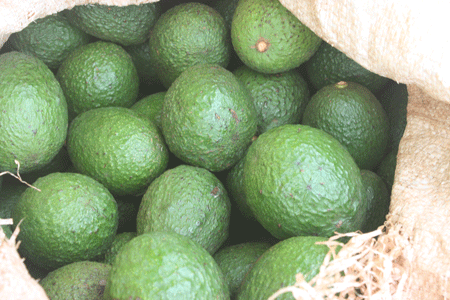
Farmers embrace the Hass Avocado variety that has higher returns
Kenya produces an estimated one hundred and fifteen thousand metric tons of avocados annually. Out of this, seventy percent are grown by small scale farmers. The local market has been a major beneficiary of these avocados, but lately, this has changed drastically. Many farmers have begun commercializing to the export market thanks to new variety; Hass,which has high demand in the European market. Other varieties grown are Fuerte and Pinkerton. Initiatives by the Kenyan government have seen a major boost to the avocado industry to fully comply with global market standards and regulations. KEPHIS has been actively involved in monitoring and educating farmers and exporters. Increased investment by county governments also plays an important role in boosting farmers who have consistently struggled with low prices from middlemen.
For instance, Murang’a County one of avocado growing areas, many farmers have embraced avocado cultivation following the County government initiative of distributing free commercially viable Hass variety seedlings to farmers. They have also directed that the price of one piece of export avocado should be at least 10 Kenya shillings. Boniface Mungai, an avocado farmer in Kawendo village, Kandara sub-county reveals that they used to cultivate fuerte and pinkerston which were not high yielding. Since they embraced Hass variety they have seen an emergence of many buyers such as; Kakuzi, Vegpro, Olvando among others. They have also seen an increase in their yields as well as income. “We cultivate avocados with my brother Stanley Gaithaiya on our family land. At the moment there are close to two hundred trees on our three acre piece of land. Our father was the pioneer of avocados in Kandara as he is the one who introduced them here in 1977. At the time he used to work with Kenya Agricultural Research Institute (KARI) now renamed Kenya Agricultural & Livestock Research Organization (KALRO) as an agricultural officer.
Most people in this area used to depend on coffee as their source of livelihood,” Boniface said. He attests that avocados are easy to grow unlike other fruits as they do well in different types of soil and do not require a lot of water and attention.They are fairly resistant to drought and average distributed rainfall is adequate for proper crop plant development. There are two ways of planting avocados. First they are planted as seedlings which involve digging huge holes to retain water when the plants are young for a better growth. Manure is also required during their initial stages for a strong and better root development. The second method is planting the ordinary avocado seeds. “Currently we are top working on the already existing trees. Top working entails cutting a whole tree and when it starts to shoot up again, we graft the emerging branches with the Hass variety to achieve a new tree which is highly productive,” Mungai elucidated.
Grafted avocados trees take close to three to four years to be ready for fruiting and fruits can be harvested to a period of four months. On average a single tree can yield to a maximum of 500 fruits in a season. The harvesting season for the fruit in this region is between the months of March to June.
Boniface attests that for them to have a bumper harvest, they usually have to crop manage their plant to the latter. This involves removing excess branches which reduces yields and application of ash to control mites which feeds on the base of the trees causing them to rot and eventually to dry. White flies are a major challenge they grapple with and to control them, they do regular sprays as well use traps. On their three acre piece of land, he reveals that they garner an average of two hundred and fifty thousand shillings in a season. ”We usually sell at forty shillings a kilogram to the established companies in the area and sometimes seven shillings per fruit to middlemen who transports the fruits to Nairobi, Thika and other major towns,” he said. A part from growing avocados for sale, they run an avocado nursery as well. This entails planting ordinary avocado seeds in small black polythene paper bags and once they sprout and attain a height of three centimeter, they graft with the scion of the Hass variety before transplanting and selling the rest. This process takes a period of four months for the grafted plants to be ready for planting. Mungai is quick to note that the demand for grafted avocados has increased by a great margin and they are receiving orders from various people within Murang’a County as well as Kiambu County. “Currently, we are now diversifying to macadamia which is proving to be highly marketable,” Mungai concluded.

